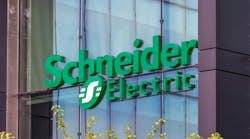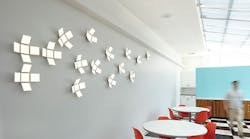Latest from News
Now that The Home Depot has begun offering four Acuity Brands luminaires using organic light-emitting diodes (OLEDs), the technology appears to be taking its first big step toward the mass market in lighting. This move, combined with news that Korean electronics giant LG Chem has an OLED system capable of producing 100 lumens per watt ready for manufacturers to start integrating into their fixture designs and that other OLED suppliers are close behind, suggests we’ll soon see OLEDs as a major factor in the lighting market.
There’s a lot to be excited about with OLEDs, because they make it possible to design lighting in ways it can’t be done with legacy lighting technologies, Jeannine Fisher Wang, director of business development and marketing for Acuity’s OLED Business Group, told Electrical Marketing in an e-mail exchange. (A longer version of this story is available to Electrical Marketing subscribers.)
“Like us, our customers see our vision that OLED offers commercially available choices that are not available today,” Wang said. “They also see that OLED will be able to offer value propositions that cannot be matched by what is available through other light sources in terms of design creativity and application for direct-view light sources, resulting in more choices for them as designers and ultimately for their clients. This includes transparent OLED panels, dynamic OLED panels, and truly flexible panels.
“We see that spaces will be illuminated in new and novel ways unconstrained by limitations of current built environments, such as through integration of lighting with architecture and furniture and the integration of personal and interactive control. These new application possibilities will bring lighting closer to the user and accelerate the adoption of OLED lighting through greater appreciation of the light. The opportunities could be endless depending on where the technology takes us.”
Acuity’s OLED products thus far have been oriented to the architectural market but with the move into Home Depot, Wang expects consumers to open up to the idea. In the immediate future, cost will be an important if not predominant factor in driving OLED adoption, but Acuity is expecting the OLED premium to fall away rather quickly. Once that happens, Wang said, OLEDs will rise to dominate some application categories.









